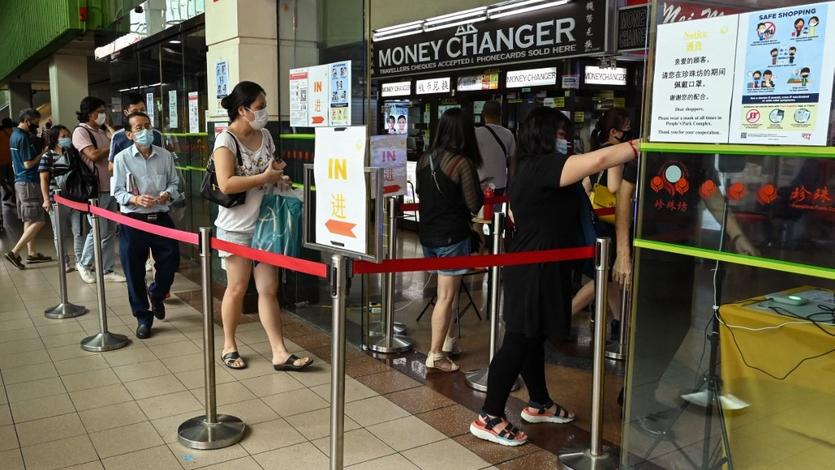 People queue as they wait to use a check-in service, which aids the process of contact tracing for COVID-19 cases, to enter a shopping centre in Chinatown district in Singapore on July 7, 2021. (ROSLAN RAHMAN / AFP)
People queue as they wait to use a check-in service, which aids the process of contact tracing for COVID-19 cases, to enter a shopping centre in Chinatown district in Singapore on July 7, 2021. (ROSLAN RAHMAN / AFP)
JERUSALEM / YANGON / SINGAPORE / COLOMBO / BAGHDAD / ANKARA / RIYADH / MANILA / CANBERRA / HANOI / SYDNEY / ISLAMABAD / WELLINGTON / SEOUL / NEW DELHI / PHNOM PENH / ULAN BATOR - Three quarters of Singapore’s COVID-19 infections in the last four weeks were among vaccinated individuals, government data shows, as a rapid ramp-up in the city state’s inoculations leaves fewer people unvaccinated.
It reported 1,096 locally transmitted cases in the last 28 days, of which 484, or 44 percent, were fully vaccinated people, while 30 percent were partially vaccinated and the remaining 25 percent were unvaccinated.
There were only seven severe cases requiring oxygen support and six of them were unvaccinated and one was partially vaccinated, the health ministry said.
“There is continuing evidence that vaccination helps to prevent serious disease when one gets infected,” the ministry said, adding all of the fully vaccinated and infected people showed no symptoms or mild symptoms.
Experts said infections reported by vaccinated people do not mean vaccines are ineffective.
“As more and more people are vaccinated in Singapore, we will see more infections happening amongst vaccinated people,” Teo Yik Ying, dean of the Saw Swee Hock School of Public Health at the National University of Singapore (NUS).
“It is important to always compare it against the proportion of people who remain unvaccinated.... Suppose Singapore achieves a rate of 100% fully vaccinated... then all infections will stem from the vaccinated people and none from the unvaccinated.”
It was not immediately clear whether the data reflects reduced protection offered by vaccines against the more contagious Delta variant, which has been the most common version of the virus in Singapore in recent months.
Singapore uses Pfizer/BioNTech vaccine and Moderna for its national vaccination programme.
Separately, Singapore will postpone its annual independence day celebrations to August 21 to curb a resurgent spread of COVID-19.
The event, which typically features a large-scale parade and draws big spectator crowds, is originally commemorated on August 9.
In light of the postponement, Prime Minister Lee Hsien Loong will also delay his associated national rally speech to August 29.
Australia
Australia's Victoria state reported a slight easing in new COVID-19 cases on Friday, while neighbouring New South Wales braces for another rise in infections despite more than half the country's population in lockdown.
Victorian officials reported 14 new locally transmitted cases, down from 26 a day earlier, all linked to the current outbreak of the highly infectious Delta strain.
New South Wales Health Minister Brad Hazzard, meanwhile, told a local radio station that his state will report new daily cases have exceeded Thursday's record for 2021 of 124. State officials are scheduled to give a daily update at 11:00 am (0100 GMT) local time.
More than 13 million people are living under lockdowns as the fast-moving Delta variant of the coronavirus spreads across three of the country's major cities - Sydney, Melbourne and Adelaide - and some regional areas.
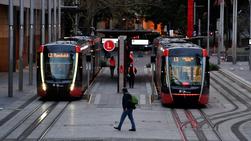 A man wearing a face mask walks towards tram station at Circular Quay in Sydney on July 19, 2021, amid a lockdown in Melbourne and Sydney as Australia seeks to contain a surge in coronavirus cases. (SAEED KHAN / AFP)
A man wearing a face mask walks towards tram station at Circular Quay in Sydney on July 19, 2021, amid a lockdown in Melbourne and Sydney as Australia seeks to contain a surge in coronavirus cases. (SAEED KHAN / AFP)
Separately, Australia's medical regulator provisionally approved Pfizer's coronavirus vaccine for individuals aged 12 to 15 years on Friday when more than half of the country's 25 million people were under lockdown.
Greg Hunt, the minister for health, on Friday announced that the Therapeutic Goods Administration (TGA) has ruled that the Pfizer-BioNTech COVID-19 vaccine is safe for 12-15 years age group.
It makes it the first coronavirus vaccine approved for individuals younger than 16 in Australia.
Up until now, the Pfizer vaccine had only been approved for use in Australia for people aged 16 years and above.
Cambodia
Cambodia on Friday reported 825 new COVID-19 infections including 335 imported cases, pushing the national total caseload to 71,244, the Ministry of Health (MoH) said in a statement.
Thirty-four more fatalities had been recorded, taking the overall death toll to 1,222, the ministry said.
India
India's COVID-19 tally rose to 31,293,062 on Friday, as 35,342 new cases were registered during the past 24 hours across the country, according to the federal health ministry's latest data.
Besides, 483 deaths due to the pandemic since Thursday morning took the total death toll to 419,470.
Iraq
Iraq reported on Thursday 8,106 new COVID-19 deaths, the highest daily record this year, taking its nationwide death toll to 18,101.
The nationwide caseload from the coronavirus in Iraq increased by 8,106 to 1,526,943, the Iraqi Health Ministry said in a statement.
The ministry added that a total of 20,819 people were vaccinated against COVID-19 during the past 24 hours across the country, bringing the total number of doses administered to 1,218,518.
Israel
The effectiveness of the Pfizer vaccine against COVID-19 has dropped to 39 percent in Israel, the country's Ministry of Health said on Thursday.
The new figure refers to the period between June 20 and July 17, the ministry said, adding that the ongoing decline was observed along with the spread of the Delta COVID-19 variant in Israel.
The latest effectiveness rate is significantly lower than that of 64 percent measured between June 6 and July 3, and 94.3 percent measured between May 2 and June 5.
However, the effectiveness of the vaccine in preventing severe coronavirus disease in Israel is currently estimated at 91.4 percent, and in preventing COVID-19 hospitalization, at 88 percent.
 A woman receives a third dose of the Pfizer-BioNTech COVID-19 vaccine at the outpatient clinics of the Cardiovascular Centre at Sheba Medical Center near Tel Aviv, Israel, on July 12, 2021. (JACK GUEZ / AFP)
A woman receives a third dose of the Pfizer-BioNTech COVID-19 vaccine at the outpatient clinics of the Cardiovascular Centre at Sheba Medical Center near Tel Aviv, Israel, on July 12, 2021. (JACK GUEZ / AFP)
Separately, Israel reimposed several coronavirus-related restrictions on Thursday, limiting entrance to large events, restaurants, gyms and other places only to people who have been vaccinated.
The Coronavirus Cabinet approved the return of the "Green Pass" at events with more than 100 people, starting from Thursday, the Prime Minister's office said in a statement.
Under the "Green Pass," only people who have been vaccinated or have recovered from the COVID-19 viruses could participate in indoor and outdoor events with more than 100 people.
The measure still needs to be approved by the government, which is expected to approve it on Sunday.
The Ministry of Health reported 1,275 new COVID-19 cases on Thursday, bringing the total tally in the country to 856,827.
The death toll from the virus in Israel rose by three to 6,457, according to the ministry.
Japan
Japan’s Olympics organizers reported a record number of new daily coronavirus infections linked to the games, bringing the total to 110 just hours before the opening ceremony is scheduled to start in a nearly empty stadium in Tokyo.
Nineteen new COVID-19 cases connected to the event were reported on Friday, the highest daily figure since organizers started disclosing the data this month. The tally included three athletes, one of whom is residing in the Olympic Village.
While the total amount of infections is small compared with the number of athletes and staff involved - tens of thousands of people are expected to travel to the Olympics - the cases add to public concern the event that could trigger more infections.
Tokyo is grappling with a surge in coronavirus cases that prompted the government to declare a fourth state of emergency in the capital earlier this month.
Malaysia
Malaysia reported 15,573 new COVID-19 infections in the highest daily spike since the outbreak, bringing the national total to 980,491, the Health Ministry said Friday.
Health Ministry Director-General Noor Hisham Abdullah said in a press conference that 32 of the new cases are imported and 15,541 are local transmissions.
Another 144 deaths have been reported, pushing the death toll to 7,718.
Some 10,094 more patients have been released after recovery, bringing the total cured and discharged to 825,387, or 84.8 percent of all cases.
Of the remaining 147,386 active cases, 939 are being held in intensive care units and 456 of those are in need of assisted breathing.
Mongolia
Mongolia reported 1,243 COVID-19 cases in the last 24 hours after 7,200 tests had been conducted across the country, bringing the national tally to 153,782, the country's health ministry said Friday.
Five of the latest confirmed cases were imported from abroad and the remaining were local infections, the ministry said in a statement.
Six more deaths were reported, raising the national count to 788, it said.
Myanmar
Myanmar's Central Committee on Prevention, Control and Treatment for COVID-19 on Thursday announced an extension of closure of basic education schools for two more weeks due to the recent detection of highly infectious COVID-19 virus variants.
The closure of basic education schools including private schools and Buddhist monastic schools was first set to end on Friday, but was further extended until Aug 8.
Myanmar reported 6,701 new confirmed cases of COVID-19, bringing the total tally to 253,364 as of Thursday, according to the latest figures by the Ministry of Health and Sports.
The COVID-19 related death toll rose to 6,133 with 319 new deaths recorded in the past 24 hours.
ALSO READ: Indonesia, M'sia report record high COVID-19 deaths
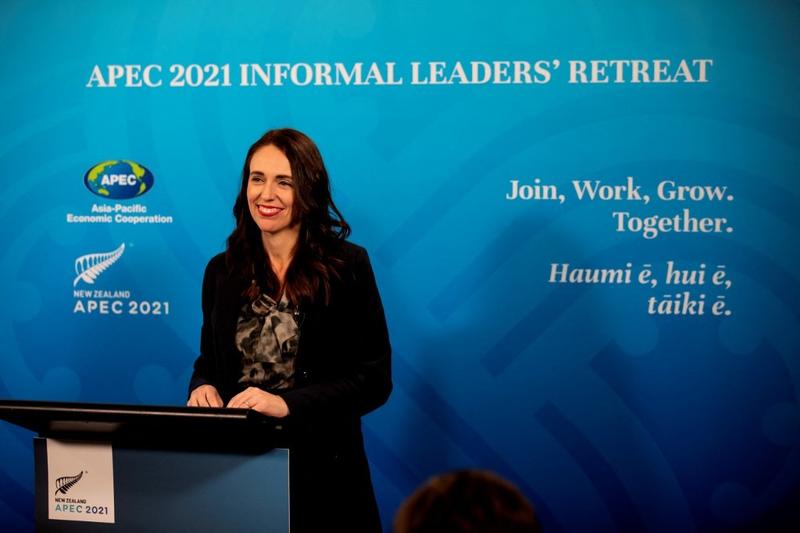 This handout picture taken and released on July 17, 2021 by APEC New Zealand shows New Zealand's Prime Minister Jacinda Ardern speaking at a press conference after the APEC Informal Leaders' Retreat at the Majestic Centre in Wellington. (JEFF TOLLAN / APEC NEW ZEALAND / AFP)
This handout picture taken and released on July 17, 2021 by APEC New Zealand shows New Zealand's Prime Minister Jacinda Ardern speaking at a press conference after the APEC Informal Leaders' Retreat at the Majestic Centre in Wellington. (JEFF TOLLAN / APEC NEW ZEALAND / AFP)
New Zealand
New Zealand will pause its quarantine-free travel arrangement with Australia for at least eight weeks starting Friday night, Prime Minister Jacinda Ardern said, as Australia fights an outbreak of the highly infectious Delta virus variant.
"We've always said that our response would evolve as the virus evolved. This is not a decision we have taken lightly, but it is the right decision to keep New Zealanders safe," Ardern told reporters in Auckland.
The "travel bubble" had already been paused for travellers to and from New South Wales, Victoria and South Australia.
The bubble had been launched as test-free as well as quarantine free, but New Zealand this month introduced a testing requirement that made it more costly for Australians to visit.
The New Zealand government said for the next week there will be return flights for New Zealanders from all Australian states and territories that will require proof of a negative pre-departure test. Passengers arriving from Sydney will be required to spend two weeks in government-managed quarantine.
New Zealand reported 19 new cases of COVID-19 in managed isolation and no cases in the community on Friday.
Pakistan
Pakistan has confirmed 1,425 new COVID-19 cases over the past 24 hours, leading the country's tally to cross the 1-million mark, the National Command and Operation Center (NCOC) said Friday morning.
It was the first time when the country reported less than 2,000 new cases in a day after almost one week's time, the NCOC's data showed.
With the new patients, the country's number of overall confirmed cases rose to 1,000,034, the NCOC, the department leading Pakistan's campaign against the pandemic, said.
The NCOC said that the country's southern Sindh province has been the worst hit, with a total of 362,182 confirmed cases, followed by eastern Punjab province where the disease was detected in 351,707 people.
A total of 22,939 people died of the disease nationwide, including 11 patients who died over the last 24 hours, the NCOC said, adding that 2,525 people are in critical condition.
 Muslim pilgrims practice social distancing as they pray at the Namira Mosque in Arafat during the annual hajj pilgrimage, near the holy city of Mecca, Saudi Arabia, Monday, July 19, 2021. Tens of thousands of vaccinated Muslim pilgrims circled Islam's holiest site in Mecca on Sunday, but remained socially distanced and wore masks as the coronavirus takes its toll on the hajj for a second year running. (AMR NABIL / AP)
Muslim pilgrims practice social distancing as they pray at the Namira Mosque in Arafat during the annual hajj pilgrimage, near the holy city of Mecca, Saudi Arabia, Monday, July 19, 2021. Tens of thousands of vaccinated Muslim pilgrims circled Islam's holiest site in Mecca on Sunday, but remained socially distanced and wore masks as the coronavirus takes its toll on the hajj for a second year running. (AMR NABIL / AP)
Saudi Arabia
Saudi Arabia announced on Thursday the successful conclusion of this year's Hajj season, free from the COVID-19 and other contagious diseases, the Saudi Press Agency reported.
Saudi Health Minister Tawfiq Al-Rabiah attributed the success to an integrated system of health facilities in the holy sites, highly equipped ambulances and qualified teams, the report said.
The minister added that limiting the number of domestic pilgrims during this Hajj season to 60,000 also contributed to the success.
For the second year in a row, Saudi Arabia has allowed only domestic pilgrims to performed Hajj to prevent the spread of the COVID-19 pandemic.
 A man waits to get coronavirus testing at a makeshift testing site in Seoul, South Korea on July 16, 2021. (AHN YOUNG-JOON / AP)
A man waits to get coronavirus testing at a makeshift testing site in Seoul, South Korea on July 16, 2021. (AHN YOUNG-JOON / AP)
South Korea
South Korea's health authorities decided Friday to extend the toughest social-distancing rules in the capital area for two more weeks amid the continued resurgence of the COVID-19 pandemic.
The Level 4 social-distancing guideline, the highest in the country's four-tier quarantine rules, will be kept in place in Seoul, its surrounding Gyeonggi province and the western port city of Incheon for two more weeks until Aug. 8.
It came as the COVID-19 resurgence here showed no signs of moderating. In the latest tally, South Korea reported 1,630 more cases of COVID-19 for the past 24 hours, raising the total number of infections to 185,733.
The daily caseload was down from the record high of 1,842 tallied in the previous day, but it hovered above 1,000 for the 17th consecutive day. The daily average tally for the past week was 1,527.
Sri Lanka
Sri Lanka on Thursday received another batch of the Sinopharm COVID-19 vaccines from China.
Officials from the Health Ministry received the vaccines which arrived at the Bandaranaike International Airport from Beijing on board two Sri Lankan Airlines charter flights on Thursday morning.
State Minister of Production, Supply and Regulation of Pharmaceuticals Channa Jayasumana said the Sinopharm vaccines will be rolled out in the districts where those above the age of 30 would be jabbed.
Thailand
Thailand reported 14,575 new infections on Friday, the highest single-day increase since the pandemic began, according to the Center for COVID-19 Situation Administration.
Despite the surge in virus cases, the nation’s tourist hotspots including Koh Phi Phi and Khao Lak will reopen from Aug 1 to vaccinated foreign tourists. The expanded opening program will allow vaccinated travelers to skip quarantine, said Thanakorn Wangboonkongchana, spokesman for the government’s panel to mitigate the economic impact from the pandemic.
ALSO READ: Thailand expands lockdown areas as COVID-19 cases surge
The Philippines
The Philippines' Department of Health (DOH) has confirmed that local transmission of the highly infectious coronavirus Delta variant, which was first detected in India.
"Following the phylogenetic analysis conducted by the University of the Philippines, Philippine Genome Center, and case investigation by the DOH Epidemiology Bureau and the regional and local epidemiology and surveillance units, clusters of Delta variant cases were seen to be linked to other local cases, therefore, exhibiting local transmission," the DOH said in a statement late on Thursday.
Some restrictions have been reimposed on the capital, including barring children ages 5 and above outdoors anew.
The Manila capital region, which accounts for about a third of the nation’s economy, will remain under general community quarantine but with heightened restrictions until July 31, presidential spokesman Harry Roque said in a statement Friday.
The Philippines has detected 47 Delta variant cases in the country so far. Eight patients linked to the variant are active, while three have died, the DOH said.
The DOH reported on Friday 6,845 new COVID-19 infections, bringing the total number of confirmed cases in the Southeast Asian country to 1,537,097.
The death toll stayed at 26,891 after no patient died from the viral disease, according to the DOH.
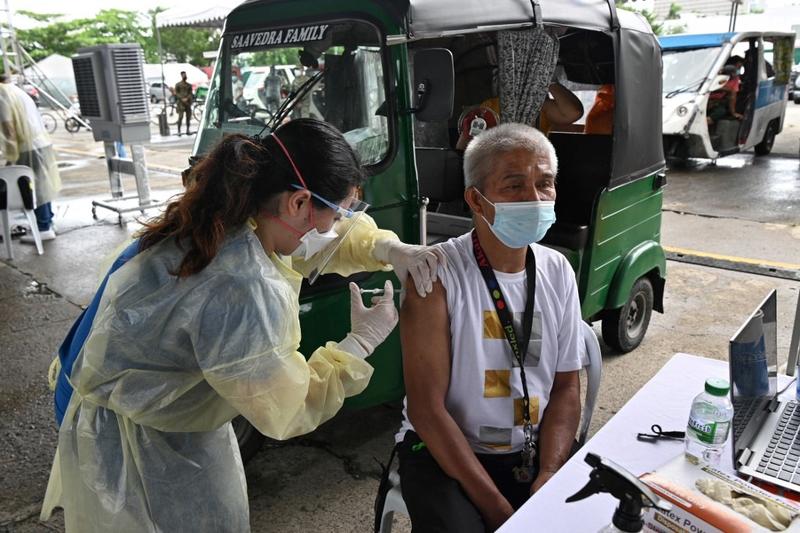 A volunteer medical worker administers a dose of the Sinovac COVID-19 vaccine to a tricycle driver during a vaccination drive for economic frontliners, organized by the vice president's office and city government, in Manila on July 20, 2021. (TED ALJIBE / AFP)
A volunteer medical worker administers a dose of the Sinovac COVID-19 vaccine to a tricycle driver during a vaccination drive for economic frontliners, organized by the vice president's office and city government, in Manila on July 20, 2021. (TED ALJIBE / AFP)
Separately, The Philippines will ban inbound travelers from Malaysia and Thailand from July 25 to 31 to prevent the spread of the highly infectious coronavirus Delta variant, presidential spokesperson Harry Roque said on Friday.
Roque said travelers coming directly from the two Southeast Asian countries or with a history of travel to any of the two countries within the last 14 days would be barred from entering.
"This action is undertaken to prevent the further spread and community transmission of COVID-19 variants in the Philippines," Roque said in a statement.
Malaysia and Thailand are experiencing a surge believed to be driven by the Delta variant cases.
Roque said that returning overseas Filipino workers under the government repatriation program are exempted from the ban but will be isolated for 14 days upon arrival.
The inclusion of Malaysia and Thailand brings to 10 the list of countries banned by the Philippines. Travelers from Indonesia, India, Pakistan, Nepal, Bangladesh, Sri Lanka, Oman and the United Arab Emirates are not allowed to enter the country until July 31.
Turkey
Over 63 percent of the eligible population of Turkey's biggest city Istanbul has been vaccinated with at least one dose of COVID-19 vaccine, local authorities announced on Friday.
More than 7.3 million citizens have got their first dose, while nearly 4 million have taken two doses in the city of over 16.5 million people, the Istanbul governor's office said.
The number of people who have received their third jab hit 540,000, it added.
Istanbul is the country's main financial and cultural hub.
"Those residing in Istanbul but currently on vacation out of the city can also be vaccinated where they are," the office said in a written message, calling on citizens not to delay their vaccination.
Having over 83 million population, Turkey has so far administered more than 64.7 million vaccine doses as part of the ongoing vaccination campaign.
According to the latest data of the Health Ministry, the vaccination ratio in some of Turkey's northwestern provinces has exceeded 77 percent.
Turkey on Thursday reported 9,586 new COVID-19 cases, the highest daily infections since late May.
The nationwide caseload of the coronavirus in Turkey increased to 5,563,903, said the Turkish Health Ministry.
The death toll from the virus in Turkey rose by 52 to 50,761, according to the ministry.
Vietnam
Vietnam’s commercial hub of Ho Chi Minh City is further tightening anti-virus curbs and will more strongly implement its stay-home order amid an aggressive virus outbreak, the central government website reported, citing a directive signed by the city’s Party Chief Nguyen Van Nen.
The city’s local infections exceeded 40,000 as of Friday morning since its 15-day stay-home order began on July 9, according to data from the health ministry.
Separately, Vietnam may approve a domestically produced COVID-19 vaccine, based on recombinant DNA/protein technology, for emergency use soon, the government said in a statement on Thursday.


